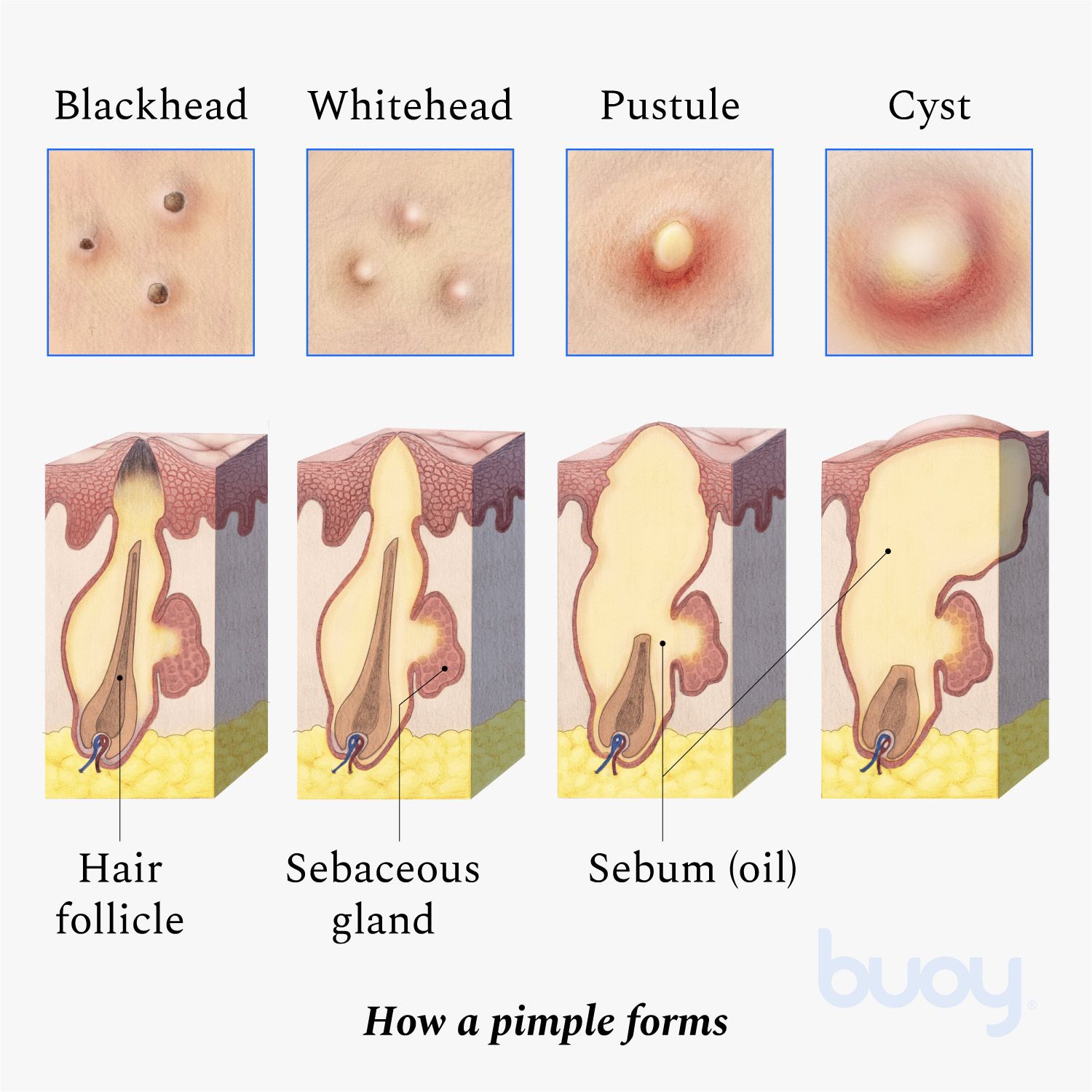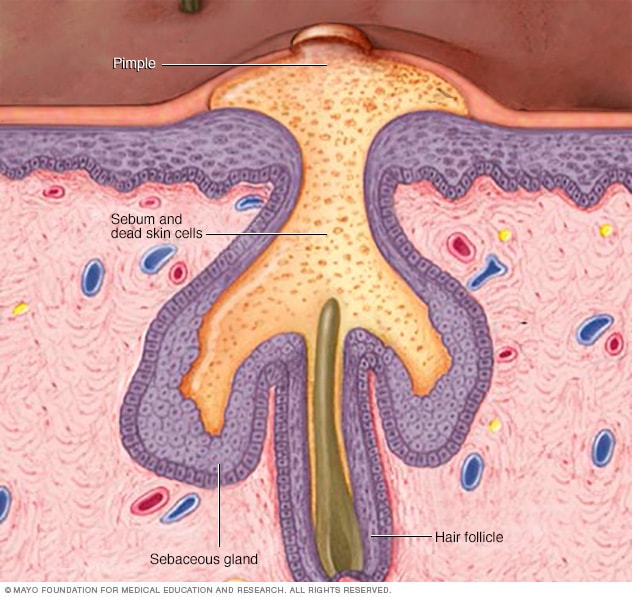Where Do Pimples Come from: Uncover the Hidden Causes
Pimples form when hair follicles become clogged with oil and dead skin cells. Bacteria can then cause inflammation and infection.
Pimples, a common skin issue, typically arise during puberty due to hormonal changes. This condition can persist into adulthood, affecting self-esteem and confidence. Sebaceous glands produce excess sebum, which mixes with dead skin cells, creating a plug in hair follicles.
Bacteria thrive in this environment, leading to redness, swelling, and pus formation. Factors like diet, stress, and skincare routines can influence pimple development. Understanding their causes helps in managing and preventing breakouts. Proper skincare, a balanced diet, and stress management play crucial roles in maintaining clear skin. Consulting a dermatologist can provide personalized treatment options for persistent acne.

Credit: www.buoyhealth.com
Pimple Basics
Understanding pimples starts with knowing the basics. Pimples are common skin issues. They occur when pores become clogged. This happens due to oil, dead skin, or bacteria. Let's dive into the details of what pimples are and their types.
What Are Pimples?
Pimples are small bumps on the skin. They often appear red or swollen. Pimples form when hair follicles get blocked. This blockage can trap oil and dead skin cells. Bacteria can then grow inside the clogged follicle, causing inflammation.
Types Of Pimples
There are different types of pimples. Each type has unique features. Here are the main types:
- Whiteheads: Small, white bumps that stay under the skin.
- Blackheads: Open at the skin's surface and look black.
- Papules: Small, red, and tender bumps.
- Pustules: Pimples with pus at the tip.
- Nodules: Large, painful lumps deep in the skin.
- Cysts: Deep, painful, pus-filled lumps.
| Type | Appearance |
|---|---|
| Whiteheads | Small, white bumps |
| Blackheads | Black, open at surface |
| Papules | Red, tender bumps |
| Pustules | Pus-filled tip |
| Nodules | Large, painful lumps |
| Cysts | Deep, pus-filled lumps |
Recognizing these types helps in treating pimples effectively. Each type may need different care. Knowing your pimple type is the first step to clear skin.
Hormonal Factors
Understanding the origins of pimples requires delving into various factors, with hormonal influences being significant. Hormonal changes affect skin health at various life stages, leading to pimple formation. Let's explore how hormones impact both teenagers and adults.
Teenage Hormones
During puberty, the body undergoes major hormonal changes. Androgens, particularly testosterone, increase. This spike stimulates sebaceous glands, leading to more oil production.
Excess oil can clog pores, resulting in pimples. Teenagers experience fluctuations in hormone levels, making skin more prone to breakouts.
Other contributing factors include:
- Stress levels: Heightened stress can affect hormone balance.
- Diet: Foods high in sugar and fat may worsen acne.
- Hygiene habits: Poor skin care can exacerbate the problem.
Adult Hormonal Changes
Adults also experience hormonal fluctuations that can lead to pimples. Women, in particular, face changes during menstrual cycles, pregnancy, and menopause.
Common triggers include:
- Menstrual cycles: Hormone levels vary, affecting oil production.
- Pregnancy: Hormonal shifts can cause sudden acne outbreaks.
- Menopause: Decreased estrogen levels may lead to dry, acne-prone skin.
Stress and diet also play roles in adult acne. Maintaining a balanced lifestyle can help manage these breakouts.
Diet And Nutrition
Many people wonder why they get pimples. Sometimes, it's due to the foods they eat. Let's talk about how diet and nutrition can affect your skin. We will focus on sugary foods and dairy products.
Sugary Foods
Sugary foods can cause pimples. When you eat a lot of sugar, your blood sugar levels rise. This can lead to more insulin in your body. High insulin can cause your skin to produce more oil. More oil can clog your pores and cause pimples.
- Candy
- Soda
- Cakes
- Pastries
Try to eat less sugar. Choose healthier snacks like fruits and nuts. Your skin will thank you!
Dairy Products
Dairy products might also cause pimples. Some studies show a link between milk and acne. Milk contains hormones that can affect your skin. These hormones can make your oil glands produce more oil. More oil can lead to pimples.
| Dairy Products | Alternatives |
|---|---|
| Milk | Almond Milk |
| Cheese | Vegan Cheese |
| Yogurt | Coconut Yogurt |
Try to limit dairy in your diet. You can switch to plant-based options. These can be kinder to your skin.

Credit: www.herocosmetics.us
Skin Care Habits
Understanding your skin care habits is key to managing pimples. Everyday routines can impact your skin's health. Let's explore common habits that could cause breakouts.
Overwashing
Washing your face too often can strip away natural oils. This can lead to dry skin, which may cause more oil production. Extra oil can clog pores and create pimples.
Stick to washing your face twice a day. Use a gentle cleanser that suits your skin type. Avoid scrubbing your face harshly. It can irritate the skin and worsen acne.
Inappropriate Products
Using the wrong products can harm your skin. Some products contain harsh chemicals that can irritate your skin. This can lead to inflammation and pimples.
Choose products labeled as "non-comedogenic." These won't clog your pores. Look for ingredients like salicylic acid or benzoyl peroxide. They help reduce acne.
Here's a quick guide to help you choose:
| Skin Type | Recommended Ingredients |
|---|---|
| Oily Skin | Salicylic Acid, Niacinamide |
| Dry Skin | Hyaluronic Acid, Glycerin |
| Sensitive Skin | Aloe Vera, Chamomile |
Avoid products with alcohol and fragrances. They can dry out and irritate your skin.
Good skin care habits are essential for clear, healthy skin. Adjust your routine to prevent pimples.
Environmental Influences
Environmental factors play a huge role in causing pimples. These factors can affect the skin's health and lead to breakouts. Two major environmental influences are pollution and climate. Understanding these can help you prevent pimples.
Pollution
Pollution is harmful to the skin. It clogs pores and leads to pimples. Smoke, dust, and chemicals in the air can stick to your skin. These particles mix with natural oils and block pores. Blocked pores become pimples.
Pollution also causes oxidative stress. This stress damages skin cells and weakens the skin's barrier. A weak skin barrier can't fight off bacteria well. Bacteria then cause infections and pimples.
Use a good cleanser to remove pollutants. Regular cleaning helps keep your skin clear. An antioxidant-rich product can also protect your skin from damage.
Climate
Climate affects your skin in many ways. Hot and humid climates make you sweat more. Sweat mixes with oils and blocks pores. This leads to pimples.
Cold and dry climates also cause problems. They strip your skin of moisture. Dry skin produces more oil to compensate. Extra oil can clog pores and cause pimples.
Adjust your skincare routine to the climate. Use lightweight products in hot weather. Choose hydrating products in cold weather. Always keep your skin clean and moisturized.

Credit: www.mayoclinic.org
Stress And Lifestyle
Many factors impact skin health. Stress and lifestyle choices play a significant role. Poor habits can lead to pimples. Understanding these factors can help manage skin issues.
Stress Levels
High stress levels affect the skin. Stress triggers hormone changes. These hormones can cause pimples.
Stress can make the skin produce more oil. Extra oil can clog pores. Clogged pores often turn into pimples.
Managing stress helps reduce pimples. Try activities that relax the mind. Yoga and meditation are good choices.
Sleep Patterns
Sleep impacts skin health. Poor sleep patterns can cause pimples. The skin repairs itself during sleep. Lack of sleep hinders this process.
Not enough sleep can increase stress. More stress can lead to more pimples. Aim for 7-9 hours of sleep each night.
Good sleep habits can improve skin health. Go to bed at the same time each night. Create a relaxing bedtime routine.
| Factors | Impact on Skin |
|---|---|
| Stress | Increases oil production, leading to pimples |
| Sleep | Lack of sleep hinders skin repair, causing pimples |
Remember, managing stress and getting enough sleep are key. Small changes can make a big difference in skin health.
Genetic Predisposition
Pimples are a common skin issue. One key factor is genetic predisposition. This means some people are more likely to get pimples due to their genes. Let's explore how genetics play a role in acne development.
Family History
Your family history can show if you might get pimples. If your parents had acne, you might get it too. This is because you inherit genes from your parents. These genes can make your skin more oily. Oily skin can cause pores to clog. Clogged pores lead to pimples.
Genetic Markers
Genes have specific markers that affect your skin. These markers can make your skin react differently. Some markers make your skin produce more oil. Other markers can cause inflammation. Both can lead to pimples.
| Genetic Factor | Effect on Skin |
|---|---|
| High Oil Production | Clogs pores and leads to pimples |
| Inflammation | Causes redness and swelling |
Understanding your genetics can help manage acne. You can choose treatments that suit your skin. Knowing your family history and genetic markers is key.
Medical Conditions
Understanding where pimples come from includes exploring various medical conditions. These health issues can play a significant role in the development of acne. Let’s dive into some of the most common medical conditions linked to pimples.
Pcos
Polycystic Ovary Syndrome (PCOS) is a condition affecting many women. PCOS causes hormonal imbalances that can lead to pimples. Women with PCOS often have higher levels of androgens. These hormones stimulate the oil glands in the skin. Increased oil can clog pores and cause pimples.
Common signs of PCOS include:
- Irregular periods
- Excessive hair growth
- Weight gain
- Thinning hair on the scalp
Treating PCOS often helps reduce acne. Doctors may prescribe medications to balance hormones. Lifestyle changes, like diet and exercise, also help manage symptoms.
Other Health Issues
Other health issues can contribute to the development of pimples. These conditions may cause hormonal changes or affect the skin directly.
Some of these health issues include:
| Condition | Description |
|---|---|
| Thyroid Disorders | Thyroid imbalances can affect hormone levels, leading to acne. |
| Diabetes | High blood sugar can lead to skin infections and pimples. |
| Gut Health Issues | Poor gut health can cause inflammation, which may result in acne. |
Addressing these underlying health issues can help manage pimples. Consult a healthcare provider for proper diagnosis and treatment options.
Frequently Asked Questions
What Causes Pimples To Form?
Pimples form when hair follicles become clogged with oil and dead skin cells. Bacteria can worsen the inflammation. Hormonal changes and stress are also contributing factors.
Can Diet Affect Pimple Formation?
Yes, diet can impact pimple formation. Foods high in sugar and dairy can trigger breakouts. Eating a balanced diet helps in reducing pimples.
Are Pimples And Acne The Same?
Pimples are a symptom of acne. Acne includes blackheads, whiteheads, and pimples. Acne is a broader skin condition.
How Can I Prevent Pimples?
To prevent pimples, cleanse your face twice daily. Avoid touching your face and use non-comedogenic products. Maintain a healthy diet and manage stress.
Conclusion
Understanding the causes of pimples helps in managing and preventing breakouts. Maintain a proper skincare routine and healthy diet. Avoid touching your face and use non-comedogenic products. Consult a dermatologist for persistent issues. Clear skin is achievable with the right knowledge and care.
Post a Comment for "Where Do Pimples Come from: Uncover the Hidden Causes"
Post a Comment